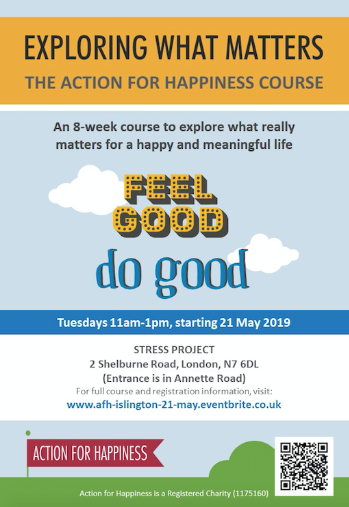| Did you know… that happiness can be measured? ...that we can learn skills to increase our happiness, even in difficult circumstances? ...that kindness is contagious? ...that human connection is key and that societies with the most social support are the happiest? … and that we can all take small steps to make big leaps in happiness levels for ourselves and our communities? From 21st May, The Stress Project will be hosting an 8 week course on what happiness means and how we can increase it for ourselves while spreading it to others. The course is designed by Action for Happiness, a charity set up to research what makes people, communities and societies happy and to spread the results. Each session opens with a short mindfulness exercise and a reflection on good things that have happened to us in the last week. This is followed by the week’s main topic, beginning with, “what really matters in life?” and “what actually makes us happy?” through explorations of our connections with others in our relationships, work and communities. A talk by an expert in the field is shown, summarising the findings of their research and explaining how individuals and societies can use this knowledge to improve wellbeing. When I first signed up for a course (run at London’s first Happiness Cafe, the Canvas Cafe in Hackney) I was sceptical. I thought it might only be about self-help, without looking at wider, social contexts. I’m a believer in compassion, cooperation and connection as essential for wellbeing. I feel there can be too much focus on individual fulfilment at the expense of consideration for others’ needs; too much belief in inner resilience, ignoring difficult circumstances and lack of social support that can make it harder to find happiness. I was very happy to find my worries were groundless! The course does show how skills for wellbeing can be learned and how we can build on our resilience to help us get through the inevitable sadnesses we all face in our lives. It also provides evidence that human beings are social animals who need supportive communities to flourish. As participants, we were encouraged to learn from each other’s experiences and views. We discussed our responses to the videos, sharing ideas about how we could use what we’d learned. Each week we planned actions to spread kindness and happiness in our everyday lives. I have fond memories from the course, where I met kind and interesting people and was invited to join exciting projects they were involved in, from poetry groups, community orchestras and cancer-support choirs to city nature walks. One week we planned small acts of kindness in the community and I suddenly found myself busy baking for the school fete, feeding a neighbour’s cats and babysitting, while filling bags of clothes and toys for the charity shop… The exercise I liked most and still keep up is noting three good things that have happened each day. Each night at bedtime my 6 year old and I now ask one another to list three things we’re glad about from our day. Tonight my son’s were, “a happy day at school, learning about moths, and us reading a story together.” A nightly reminder of simple, good things. I’ve volunteered to help run the Exploring What Matters course because I found its enthusiasm for putting its research into practice infectious. I feel it can inspire us to seek and spread happiness by creating caring connections and building compassionate communities. Getting together to explore and come up with creative ways to spread wellbeing is a great start to making a happier society. To sign-up to the course please visit; www.afh-islngton-21-may.eventbrite.co.uk Rowan |
|
0 Comments
Your comment will be posted after it is approved.
Leave a Reply. |
Archives
January 2024
Categories |


 RSS Feed
RSS Feed